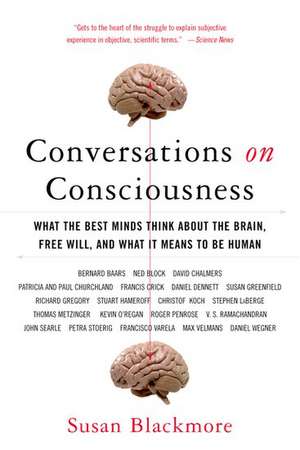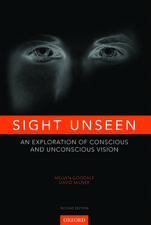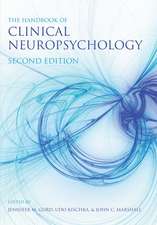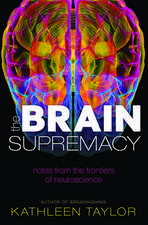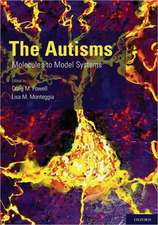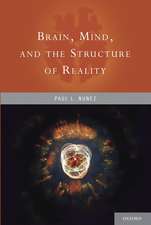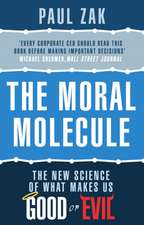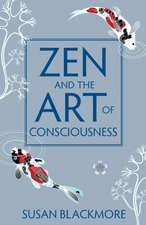Conversations on Consciousness
Autor Susan Blackmoreen Limba Engleză Paperback – 31 dec 2006
Paired with an introduction and extensive glossary that provide helpful background information, these provocative conversations illuminate how some of the greatest minds tackle some of the most difficult questions about human nature.
| Toate formatele și edițiile | Preț | Express |
|---|---|---|
| Paperback (2) | 70.79 lei 10-16 zile | +27.61 lei 7-13 zile |
| Oxford University Press – 26 oct 2006 | 70.79 lei 10-16 zile | +27.61 lei 7-13 zile |
| Oxford University Press – 31 dec 2006 | 111.28 lei 3-5 săpt. |
Preț: 111.28 lei
Nou
Puncte Express: 167
Preț estimativ în valută:
21.29€ • 22.23$ • 17.62£
21.29€ • 22.23$ • 17.62£
Carte disponibilă
Livrare economică 15-29 martie
Preluare comenzi: 021 569.72.76
Specificații
ISBN-13: 9780195179590
ISBN-10: 0195179595
Pagini: 274
Dimensiuni: 213 x 140 x 18 mm
Greutate: 0.36 kg
Editura: Oxford University Press
ISBN-10: 0195179595
Pagini: 274
Dimensiuni: 213 x 140 x 18 mm
Greutate: 0.36 kg
Editura: Oxford University Press
Notă biografică
Susan Blackmore is a freelance writer, lecturer and broadcaster, and a Visiting Lecturer at the University of the West of England, Bristol. Her research interests include memes and the theory of memetics, evolutionary theory, consciousness, and meditation. She is author of The Meme Machine, as well as over seventy academic articles.
Recenzii
"Consciousness. Where does it come from? Is it somehow separate from the human brain? Can the brain itself comprehend it? Blackmore, a lecturer in psychology at the University of the West of England, poses these and other intriguing questions to some of the top thinkers in philosophy and brain studies. In each interview, the author gets to the heart of the struggle to explain subjective experience in objective, scientific terms. Francis Crick, Daniel Dennett, John Searle, David Chalmers, and others describe the fundamental ideas behind the study of consciousness, including free will, the separation of mind and body, artificial intelligence, and conscious versus unconscious experience."--Science News"Succeeds in providing a very brief survey of the multitude of positions occupied by thinkers in this area.... The often quirky personalities and mannerisms of the interviewees shine through the text.... Blackmore herself comes across as spunky and clever, and the probing follow-up questions she occasionally asks prevent the interviews from seeming too repetitive and boring."--Nature"Susan Blackmore posed the question "What is consciousness?" to 21 leading scientists and philosophers who study consciousness for a living. It provokes all kinds of responses, ranging from jokes about psychedelic drugs to brow-furrowing discourses on life's meaning."-- Richard Lipkin, ScientificAmerican"Are some scientists zombies? That is among the thoughts raised by this diverting collection of interviews with neurobiologists, philosophers and others engaged in the study of the mind...a very efficient overview of contemporary strands of thinking about its subject."--Steven Poole, GuardianUnlimited "Blackmore interrogates 20 mind-body experts--philosophers, neuroscientists, psychologists, and various hybrids. She doesn't stand on ceremony, is persistent, probing, honest about her puzzlements, and happy to defend her own views if the occasion arises, which once
Descriere
Descriere de la o altă ediție sau format:
Conversations on Consciousness is just that - a series of twenty lively and challenging conversations between Sue Blackmore and some of the world's leading philosophers and scientists. Written in a colloquial and engaging style the book records the conversations Sue had when she met these influential thinkers, whether at conferences in Arizona or Antwerp, or in their labs or homes in Oxford or San Diego. The conversations bring out their very different personalities and styles and reveal a wealth of fascinating detail about their theories and beliefs. Why is consciousness such a special and difficult issue for twenty-first century science? Sue, herself a researcher into this controversial and difficult topic, begins by asking each of her colleagues this simple question and is immediately plunged into the depths of the debate: How do the subjective experiences we call consciousness arise from the physical brain? Is this even the right question to ask? Can zombies - people who behave outwardly just like others but have no inner mental life - exist? What can dreams tell us about consciousness? Should we all be learning to meditate? Do we have free will, and if not is it possible to live without it? With an introduction setting out the broad structure of the debate on consciousness, and an extensive glossary, this book provides an engaging and accessible account of the most challenging problem of all, through the words of some of the leading figures involved in seeking to solve it.
Conversations on Consciousness is just that - a series of twenty lively and challenging conversations between Sue Blackmore and some of the world's leading philosophers and scientists. Written in a colloquial and engaging style the book records the conversations Sue had when she met these influential thinkers, whether at conferences in Arizona or Antwerp, or in their labs or homes in Oxford or San Diego. The conversations bring out their very different personalities and styles and reveal a wealth of fascinating detail about their theories and beliefs. Why is consciousness such a special and difficult issue for twenty-first century science? Sue, herself a researcher into this controversial and difficult topic, begins by asking each of her colleagues this simple question and is immediately plunged into the depths of the debate: How do the subjective experiences we call consciousness arise from the physical brain? Is this even the right question to ask? Can zombies - people who behave outwardly just like others but have no inner mental life - exist? What can dreams tell us about consciousness? Should we all be learning to meditate? Do we have free will, and if not is it possible to live without it? With an introduction setting out the broad structure of the debate on consciousness, and an extensive glossary, this book provides an engaging and accessible account of the most challenging problem of all, through the words of some of the leading figures involved in seeking to solve it.
